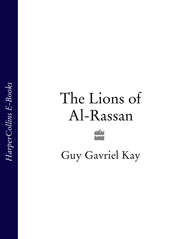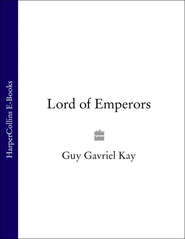По всем вопросам обращайтесь на: info@litportal.ru
(©) 2003-2025.
✖
Under Heaven
Автор
Год написания книги
2018
Настройки чтения
Размер шрифта
Высота строк
Поля
Gnam shrugged. He spurred his horse and rode away. They stood there, the two of them, and watched him go in the waning of the light, saw him gallop very fast around the near side of the lake as if spirits were pursuing him, tracking his breath and blood.
CHAPTER III (#ulink_af86e85b-7ea3-5b6b-857c-a0df2934de4d)
The armies of the empire had changed over the past fifty years, and changes were continuing. The old fupei system of a peasant militia summoned for part of the year then returning to their farms for the harvest had grown more and more inadequate to the needs of an expanding empire.
The borders had been pushed west and north and northeast and even south past the Great River through the disease-ridden tropics to the pearl-diver seas. Collisions with Tagurans to the west and the various Bogü tribal factions north had increased, as did the need to protect the flow of luxuries that came on the Silk Roads. The emergence of border forts and garrisons farther and farther out had ended the militia system with its back-and-forth of farmer-soldiers.
Soldiers were professionals now, or they were supposed to be. More and more often they and their officers were drawn from nomads beyond the Long Wall, subdued and co-opted by the Kitan. Even the military governors were often foreigners now. Certainly the most powerful one was.
It marked a change. A large one.
The soldiers served year-round and, for years now, were paid from the imperial treasury and supported by a virtual army of peasants and labourers building forts and walls, supplying food and weapons and clothing and entertainment of any and all kinds.
It made for better-trained fighters familiar with their terrain, but a standing army of this size did not come without costs—and increased taxes were only the most obvious consequence.
In years and regions of relative peace, without drought or flood, with wealth now flowing at an almost unimaginable rate into Xinan and Yenling and the other great cities, the cost of the new armies was bearable. In hard years it became a problem. And other issues, less readily seen, were growing. At the lowest ebb, of a person or a nation, the first seeds of later glory may sometimes be seen, looking back with a careful eye. At the absolute summit of accomplishment the insects chewing from within at the most extravagant sandalwood may be heard, if the nights are quiet enough.
A QUIET-ENOUGH NIGHT. Wolves had been howling in the canyon earlier, but had stopped. The darkness was giving way, for those on watch on the ramparts of Iron Gate Fort, to a nearly-summer sunrise. Pale light pulling a curtain of shadows back—as in a puppet show at a town market—from the narrow space between ravine walls.
Though that, thought Wujen Ning, from his post on the ramparts, was not quite right. Street theatre curtains were pulled to the side—he’d seen them in Chenyao.
Ning was one of the native-born Kitan here, having followed his father and older brothers into the army. There was no family farm for him to rely upon for an income, or return to visit. He wasn’t married.
He spent his half-year leave time in the town between Iron Gate and Chenyao. There were wine shops and food sellers and women to take his strings of cash. Once, given two weeks’ leave, he’d gone to Chenyao itself, five days away. Home was too far.
Chenyao had been, by a great deal, the biggest city he’d ever seen. It had frightened him, and he’d never gone back. He didn’t believe the others when they said it wasn’t that large, as cities went.
Here in the pass, in the quiet of it, the dawn light was filtering downwards. It struck the tops of the cliffs first, pulling them from shadow, and worked its way towards the still-dark valley floor as the sun rose over the mighty empire behind them.
Wujen Ning had never seen the sea, but it pleased him to imagine the vast lands of Kitai stretching east to the ocean and the islands in it where immortals dwelled.
He glanced down at the dark, dusty courtyard. He adjusted his helmet. They had a commander now who was obsessed with helmets and properly worn uniforms, as if a screaming horde of Tagurans might come storming down the valley at any moment and sweep over the fortress walls if someone’s tunic or sword belt was awry.
As if, Ning thought. He spat over the wall through his missing front tooth. As if the might of the Kitan Empire in this resplendent Ninth Dynasty, and the three hundred soldiers in this fort that commanded the pass, were a nuisance like mosquitoes.
He slapped at one of those on his neck. They were worse to the south, but this pre-dawn hour brought out enough of the bloodsuckers to make for annoyance. He looked up. Scattered clouds, a west wind in his face. The last stars nearly gone. He’d be off duty at the next drum, could go down to breakfast and sleep.
He scanned the empty ravine, and realized it wasn’t empty.
What he saw, in the mist slowly dispersing, made him shout for a runner to go to the commander.
A lone man approaching before sunrise wasn’t a threat, but it was unusual enough to get an officer up on the wall.
Then, as he came nearer, the rider lifted a hand, gesturing for the gates to be opened for him. At first Ning was astonished at the arrogance of that, and then he saw the horse the man was riding.
He watched them come on, horse and rider taking clearer form, like spirits entering the real world through fog. That was a strange thought. Ning spat again, between his fingers this time for protection.
He wanted the horse the moment he saw it. Every man in Iron Gate would want that horse. By the bones of his honoured ancestors, Wujen Ning thought, every man in the empire would.
“Why you so sure that one didn’t bring her to you?” Bytsan had asked.
“He did bring her. Or she brought him.”
“Stop being clever, Kitan. You know what I mean.”
Some irritation, understandable. They’d been on their eighth or ninth cup of wine, at least—it had been considered ill-bred among the students in Xinan to keep count.
Night outside by then, but moonlit, so silver in the cabin.
Tai had also lit candles, thinking light would help the other man. The ghosts were out there, as always. You could hear their voices, as always. Tai was used to it, but felt unsettled to realize this was his last night. He wondered if they might know it, somehow.
Bytsan wouldn’t be—couldn’t be—accustomed to any of this.
The voices of the dead offered anger and sorrow, sometimes dark, hard pain, as if trapped forever in the moment of their dying. The sounds swirled from outside the cabin windows, gliding along the rooftop. Some came from farther off, towards the lake or the trees.
Tai tried to remember the dry-mouthed terror he’d lived with on his first nights two years ago. It was hard to reclaim those feelings after so long, but he remembered sweating and shivering, clutching a sword hilt in bed.
If cups of warmed rice wine were going to help the Taguran deal with a hundred thousand ghosts, less the ones buried by Shen Tai in two years…that was the way it was. That was all right.
They’d buried Yan and the assassin in the pit Tai had begun that afternoon. It wasn’t nearly deep enough yet for the bones he’d planned, which made it good for two Kitan just slain, one by sword, one by arrows, sent over to the night.
They’d wrapped them in winter sheepskin he wasn’t using (and would never use again) and carried them down the row of mounds in the last of the day’s light.
Tai had jumped into the pit and the Taguran had handed down Yan’s body and he’d laid his friend in the ground and climbed out of the grave.
Then they’d dropped the assassin in beside Yan and shovelled the earth from next to the open pit back in and pounded it hard on top and all around with the flat sides of the shovels, against the animals that might come, and Tai had spoken a prayer from the teachings of the Path, and poured a libation over the grave, while the Taguran stood by, facing south towards his gods.
It had been nearly dark by then and they’d made their way hastily back to the cabin as the evening star, the one the Kitan people called Great White, appeared in the west, following the sun down. Poets’ star at evening, soldiers’ in the morning.
There hadn’t been anything in the way of fresh food. On a normal day, Tai would have caught a fish, gathered eggs, shot a bird and plucked it for cooking at day’s end, but there had been no time for that today.
They’d boiled dried, salted pork and eaten it with kale and hazelnuts in bowls of rice. The Tagurans had brought early peaches, which were good. And they’d had the new rice wine. They drank as they ate, and continued when the meal was done.
The ghosts had begun with the starlight.
“You know what I mean,” Bytsan repeated, a little too loudly. “Why’re you so sure of him? Chou Yan? You trust everyone who names himself a friend?”
Tai shook his head. “Isn’t in my nature to be trusting. But Yan was too proud of himself when he saw me, and too astonished when she drew her swords.”
“A Kitan can’t deceive?”
Tai shook his head again. “I knew him.” He sipped his wine. “But someone knew me, if they told her not to fight. She said she’d have preferred to kill me in a combat. And she knew I was here. Yan didn’t know. She let him go first to my father’s house. Didn’t give away where I was—he’d have suspected something. Maybe. He wasn’t a suspicious man.”
Bytsan looked at Tai narrowly, considering all this. “Why would a Kanlin Warrior fear you?”
He wasn’t so drunk, after all. Tai couldn’t see how it would hurt to answer.
“I trained with them. At Stone Drum Mountain, nearly two years.” He watched the other man react. “It would take me time to get my skills back, but someone may not have wanted to chance it.”











